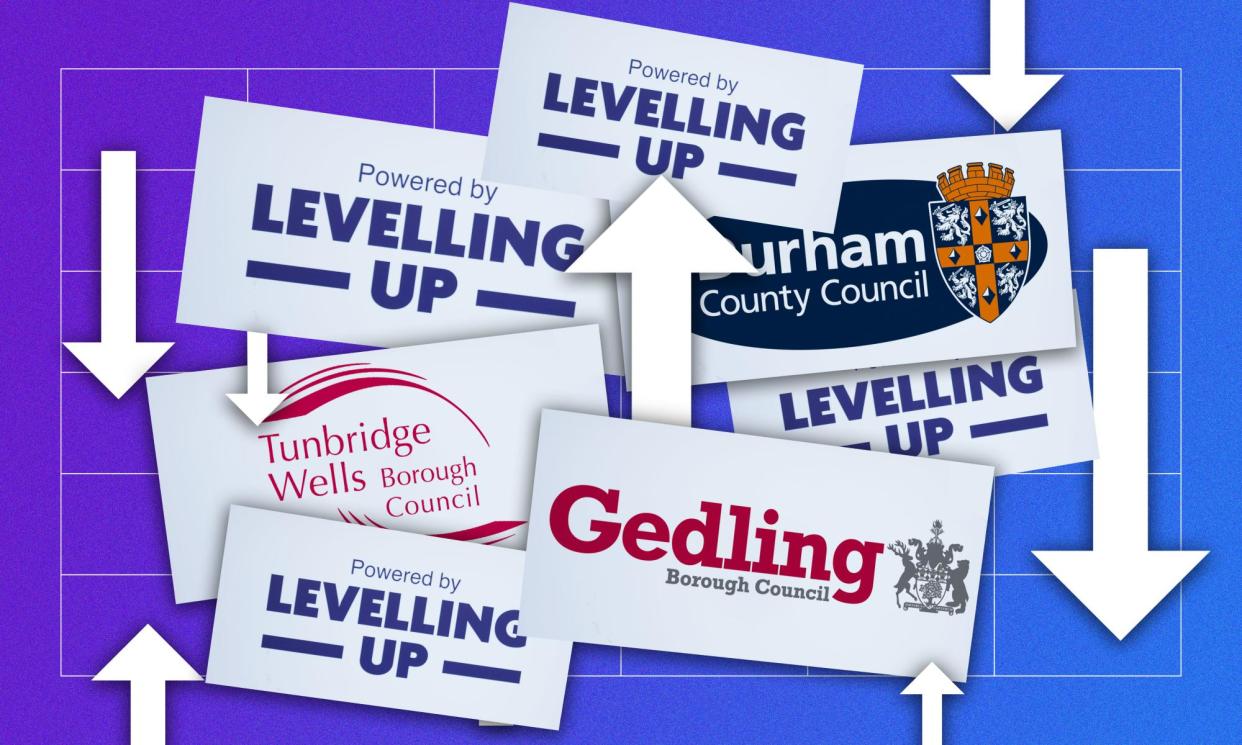Councils demand independent review of ‘arbitrary’ levelling up schemes

Councils have called for an independent review of Boris Johnson’s levelling up policy, as local authorities count the cost of years of hype, disappointment, bureaucratic delay and “begging bowl” culture.
Levelling up was launched by Johnson after the Conservatives won the 2019 general election, as he promised to boost left-behind parts of the UK by committing billions to regenerate town centres, upgrade local transport and invest in cultural assets.
Four years and several funding rounds later, many local politicians are angry and frustrated over their experiences with a complex, demanding, seemingly random bidding system for numerous pots of levelling up funds that have ultimately so far led to little change.
Even more baffling to many is the evolution of a policy that seemingly sought initially to prioritise deprived post-industrial cities of the north and Midlands in the name of reducing regional inequality, but now embraces such relatively affluent places as Cambridge, Buckinghamshire and Canary Wharf in London’s docklands.
“One of our bids was for a housing site in the most deprived part of County Durham – top 10 most deprived areas in the country. How can that not be eligible for levelling up but a historic castle renovation in Kent can? What’s levelling up about that?” said Amanda Hopgood, the Liberal Democrat leader of Durham county council.
Related: Levelling up report card: how the Tories’ pledges stack up today
Confusingly, three of the top 20 most deprived council areas in England – Middlesbrough, Hastings and Rochdale – were awarded no cash over three rounds of the actual levelling up fund, although they did get cash from different pots under the wider collection of levelling up funds, including the towns fund and the shared prosperity fund (there are now an estimated 36 pots in total.)
The funds have different eligibility, application and reporting requirements, with each bid typically costing councils between £30,000 and £60,000, according to parliament’s spending watchdog. Some councils say they have heeded official feedback on failed bids and invested heavily in the next bid, only to be knocked back again “having done everything they asked”.
Gedling borough council in Nottinghamshire learned in November it had yet again failed with a levelling up fund bid (three neighbouring councils had by that stage been awarded tens of millions between them). It furiously accused the government of “moving the goalposts and leaving councils like us with absolutely nothing, time and time again”.
This month, after years of trying, it finally succeeded – getting £20m from the long-term plan for towns fund. “The begging bowl culture created by this government when it comes to allocating funding to local towns, means this funding has come years later than it should have done,” said Michael Payne, the deputy leader of Gedling borough council.
Hopgood called for an independent review of the government’s “dreadful” handling of a bids process that led to councils wasting scarce resources of time and money. County Durham estimates it spent £1.2m on five bids that were unsuccessful after the government changed the rules on eligibility after they had been submitted.
“The frustration is – you spend your time bidding. You haven’t actually got the money to do the bidding or the resources. The successful bids seem arbitrary. You can’t be certain the outcome related to the quality of the bid. You start to believe its been tweaked politically,” said Graham Chapman, a Nottingham City Labour councillor and vice-chair of the Special Interest Group Of Municipal Authorities.
One council chief executive in the south of England lamented the stop-start short-termism of levelling up, made worse by huge council budget cuts. He pointed to the success of a municipal arts centre planned and built locally under an old-style regeneration scheme before austerity took hold. “We would never build that today because there isn’t the resource, the certainty or the capacity to do it.”
Chapman criticises levelling up’s lack of ambition and focus on physical infrastructure at the expense of tackling skills shortages: “It was the only game in town, but it was naive, totally superficial and underfunded. You don’t turn anything around with a few bob over a few years. You can’t just tart up the town centre and think you are levelling up,” he said.
The government insists it is regenerating town centres, creating new infrastructure and helping to level up communities. This months’s public accounts committee report is less optimistic, highlighting huge project delays – just 10% of funds allocated have been spent. The Labour party has compared levelling up to the “burnt out shell” of an abandoned car.
Prof Graeme Atherton of the Centre for Inequality and Levelling Up said despite widespread criticisms, a case can be made for the policy having worked on its own narrow terms, achieving a Johnsonian “cake and eat it” trick of reaching some target places while managing to keep other places relatively happy. “Whether levelling up is successful or appropriate is another set of questions,” he added.
A Department for Levelling Up, Housing and Communities spokesperson said: “We reject these claims and are proud of our record of funding historically overlooked areas. We have committed over £15bn of levelling up funds to regenerate town centres, create new infrastructure and improve everyday life for people.”


